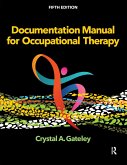Karen Sladyk
Ryan's Occupational Therapy Assistant (eBook, ePUB)
Principles, Practice Issues, and Techniques
85,95 €
85,95 €
inkl. MwSt.
Sofort per Download lieferbar

43 °P sammeln
85,95 €
Als Download kaufen

85,95 €
inkl. MwSt.
Sofort per Download lieferbar

43 °P sammeln
Jetzt verschenken
Alle Infos zum eBook verschenken
85,95 €
inkl. MwSt.
Sofort per Download lieferbar
Alle Infos zum eBook verschenken

43 °P sammeln
Karen Sladyk
Ryan's Occupational Therapy Assistant (eBook, ePUB)
Principles, Practice Issues, and Techniques
- Format: ePub
- Merkliste
- Auf die Merkliste
- Bewerten Bewerten
- Teilen
- Produkt teilen
- Produkterinnerung
- Produkterinnerung

Bitte loggen Sie sich zunächst in Ihr Kundenkonto ein oder registrieren Sie sich bei
bücher.de, um das eBook-Abo tolino select nutzen zu können.
Hier können Sie sich einloggen
Hier können Sie sich einloggen
Sie sind bereits eingeloggt. Klicken Sie auf 2. tolino select Abo, um fortzufahren.

Bitte loggen Sie sich zunächst in Ihr Kundenkonto ein oder registrieren Sie sich bei bücher.de, um das eBook-Abo tolino select nutzen zu können.
Ryan's Occupational Therapy Assistant: Principles, Practice Issues, and Techniques continues to keep pace with the latest developments in occupational therapy, including the integration of key concepts from key documents for the occupational therapy profession.
- Geräte: eReader
- ohne Kopierschutz
- eBook Hilfe
Andere Kunden interessierten sich auch für
![Ryan's Occupational Therapy Assistant (eBook, PDF) Ryan's Occupational Therapy Assistant (eBook, PDF)]() Karen SladykRyan's Occupational Therapy Assistant (eBook, PDF)85,95 €
Karen SladykRyan's Occupational Therapy Assistant (eBook, PDF)85,95 €![Mental Health Practice for the Occupational Therapy Assistant (eBook, ePUB) Mental Health Practice for the Occupational Therapy Assistant (eBook, ePUB)]() Christine ManvilleMental Health Practice for the Occupational Therapy Assistant (eBook, ePUB)69,95 €
Christine ManvilleMental Health Practice for the Occupational Therapy Assistant (eBook, ePUB)69,95 €![Kinesiology for the Occupational Therapy Assistant (eBook, ePUB) Kinesiology for the Occupational Therapy Assistant (eBook, ePUB)]() Susan SainKinesiology for the Occupational Therapy Assistant (eBook, ePUB)72,95 €
Susan SainKinesiology for the Occupational Therapy Assistant (eBook, ePUB)72,95 €![Best Practice Occupational Therapy for Children and Families in Community Settings (eBook, ePUB) Best Practice Occupational Therapy for Children and Families in Community Settings (eBook, ePUB)]() Winnie DunnBest Practice Occupational Therapy for Children and Families in Community Settings (eBook, ePUB)78,95 €
Winnie DunnBest Practice Occupational Therapy for Children and Families in Community Settings (eBook, ePUB)78,95 €![Documentation Manual for Occupational Therapy (eBook, ePUB) Documentation Manual for Occupational Therapy (eBook, ePUB)]() Crystal GateleyDocumentation Manual for Occupational Therapy (eBook, ePUB)71,95 €
Crystal GateleyDocumentation Manual for Occupational Therapy (eBook, ePUB)71,95 €![Occupational Therapy Essentials for Clinical Competence (eBook, ePUB) Occupational Therapy Essentials for Clinical Competence (eBook, ePUB)]() Karen JacobsOccupational Therapy Essentials for Clinical Competence (eBook, ePUB)98,95 €
Karen JacobsOccupational Therapy Essentials for Clinical Competence (eBook, ePUB)98,95 €![Occupational Therapy Models for Intervention with Children and Families (eBook, ePUB) Occupational Therapy Models for Intervention with Children and Families (eBook, ePUB)]() Sandra DunbarOccupational Therapy Models for Intervention with Children and Families (eBook, ePUB)82,95 €
Sandra DunbarOccupational Therapy Models for Intervention with Children and Families (eBook, ePUB)82,95 €-
-
-
Ryan's Occupational Therapy Assistant: Principles, Practice Issues, and Techniques continues to keep pace with the latest developments in occupational therapy, including the integration of key concepts from key documents for the occupational therapy profession.
Dieser Download kann aus rechtlichen Gründen nur mit Rechnungsadresse in A, B, BG, CY, CZ, D, DK, EW, E, FIN, F, GR, HR, H, IRL, I, LT, L, LR, M, NL, PL, P, R, S, SLO, SK ausgeliefert werden.
Produktdetails
- Produktdetails
- Verlag: Taylor & Francis eBooks
- Erscheinungstermin: 1. Juni 2024
- Englisch
- ISBN-13: 9781040135822
- Artikelnr.: 70885595
- Verlag: Taylor & Francis eBooks
- Erscheinungstermin: 1. Juni 2024
- Englisch
- ISBN-13: 9781040135822
- Artikelnr.: 70885595
- Herstellerkennzeichnung Die Herstellerinformationen sind derzeit nicht verfügbar.
Karen Sladyk, PhD, OTR, FAOTA is professor and founding chair of OT at Bay Path University in Longmeadow, Massachusetts. Karen received her bachelor's degree in OT from Eastern Michigan University and a master's degree in Community Health Education from Southern Connecticut State University. Her practice interests in mental health and cognitive rehabilitation led to her pursuit of a doctorate in Adult and Vocational Education at the University of Connecticut. An educator for 25 years, Karen is very interested in how students learn to become excellent practitioners. She has edited several OT texts with a focus on helping OT and OTA students master the content of OT education. In her free time she quilts, antiques for vintage jewelry, and travels to spend time with her nieces and nephews.
Sally E . Ryan, COTA, ROH, Retired is a graduate of the first occupational therapy assistant (OTA) program at Duluth, Minnesota, in 1964. She has taken extensive coursework at the University of Minnesota as a James Wright Hunt Scholar, and at the College of St. Catherine, St. Paul. Her background includes experience in practice, clinical education supervision, management in long-term care, consultation, and teaching in the professional occupational therapy (OT) program at the College of St. Catherine. In the past, Sally has served in a variety of leadership positions at the local, state, and national levels, including the American Occupational Therapy Association (AOTA) Executive Board and on-site evaluator of the AOTA Accreditation Committee. Sally is the recipient of numerous state and national awards. She was the first COTA to receive the AOTA Award of Excellence and was among the first recipients of the AOTA Roster of Honor. Sally has retired and is enjoying interior decorating, photography, needlework, and gardening.
Sally E . Ryan, COTA, ROH, Retired is a graduate of the first occupational therapy assistant (OTA) program at Duluth, Minnesota, in 1964. She has taken extensive coursework at the University of Minnesota as a James Wright Hunt Scholar, and at the College of St. Catherine, St. Paul. Her background includes experience in practice, clinical education supervision, management in long-term care, consultation, and teaching in the professional occupational therapy (OT) program at the College of St. Catherine. In the past, Sally has served in a variety of leadership positions at the local, state, and national levels, including the American Occupational Therapy Association (AOTA) Executive Board and on-site evaluator of the AOTA Accreditation Committee. Sally is the recipient of numerous state and national awards. She was the first COTA to receive the AOTA Award of Excellence and was among the first recipients of the AOTA Roster of Honor. Sally has retired and is enjoying interior decorating, photography, needlework, and gardening.
About the Editors Current Contributors Introduction Section I Historical,
Philosophical, and Theoretical Principles Chapter 1 Looking Back, Living
Forward: Occupational Therapy History Chapter 2 The Occupational Therapy
Assistant Heritage: Proud and Dynamic Chapter 3 Philosophy and Core Values
in Occupational Therapy Chapter 4 Human Development Chapter 5 Occupational
Therapy Practice Framework: Domain and Process-Our Language Chapter 6
Activity Analysis: Our Tool and Chapter 7 Theory That Guides Practice: Our
Map Chapter 8 Therapeutic Intervention Process Chapter 9 Occupation: An
Individual's Choice Chapter 10 Teaching and Learning Section II Occupations
and Disabilities Chapter 11 A Young Child With Visual Impairments Chapter
12 A Toddler With an Autism Spectrum Disorder Chapter 13 A Kindergartner
With Sensory Integration Dysfunction Chapter 14 Two Children With Cerebral
Palsy Chapter 15 A Second-Grader With Oppositional Defiant Disorder and
Chapter 16 A Third-Grader With Attention Deficit Hyperactivity Disorder
Chapter 17 A 10-Year-Old Magician With Down Syndrome Chapter 18 A Teenager
With Depression Chapter 19 A Car Mechanic With Traumatic Brain Injury
Chapter 20 A Telephone Repairman With Spinal Cord Injury Chapter 21 A
Teacher's Aide With Schizophrenia Chapter 22 A Mother and Caterer With
Multiple Sclerosis Chapter 23 A Self-Help Group Leader With Anxiety Chapter
24 Three Picnickers Across the Age Span With Arthritis Chapter 25 A
Cafeteria Worker With Diabetes and Bipolar Disorder Chapter 26 A Plumber
and Golfer With Total Hip Arthroplasty Chapter 27 A Senior Homemaker With
Substance Abuse and Denise Chapter 28 A Businessman With a Stroke Chapter
29 A Homemaker and Volunteer With Parkinson's Disease Chapter 30 A Retired
Librarian With Sensory Deficits Chapter 31 A Married Couple Dealing With
Alzheimer's Disease Section III Treatment Techniques, Procedures, and
Concepts Chapter 32 Group Intervention Chapter 33 Arts and Crafts as
Meaningful Occupation Chapter 34 Assistive Technology and Adaptive
Equipment Chapter 35 Basic Splinting Chapter 36 Wellness and Health
Promotion Chapter 37 Life Skills Chapter 38 Activities of Daily Living
Chapter 39 Work Injury Activities Section IV Management and Practice Issues
Chapter 40 Evidence-Based Practice Chapter 41 Understanding Research
Chapter 42 Documentation Chapter 43 Occupational Therapy Assistant
Supervision and Chapter 44 The Occupational Therapy Assistant as Activity
Director and Chapter 45 Functional Ethics Chapter 46 Management Issues
Chapter 47 Professional Development D Index
Philosophical, and Theoretical Principles Chapter 1 Looking Back, Living
Forward: Occupational Therapy History Chapter 2 The Occupational Therapy
Assistant Heritage: Proud and Dynamic Chapter 3 Philosophy and Core Values
in Occupational Therapy Chapter 4 Human Development Chapter 5 Occupational
Therapy Practice Framework: Domain and Process-Our Language Chapter 6
Activity Analysis: Our Tool and Chapter 7 Theory That Guides Practice: Our
Map Chapter 8 Therapeutic Intervention Process Chapter 9 Occupation: An
Individual's Choice Chapter 10 Teaching and Learning Section II Occupations
and Disabilities Chapter 11 A Young Child With Visual Impairments Chapter
12 A Toddler With an Autism Spectrum Disorder Chapter 13 A Kindergartner
With Sensory Integration Dysfunction Chapter 14 Two Children With Cerebral
Palsy Chapter 15 A Second-Grader With Oppositional Defiant Disorder and
Chapter 16 A Third-Grader With Attention Deficit Hyperactivity Disorder
Chapter 17 A 10-Year-Old Magician With Down Syndrome Chapter 18 A Teenager
With Depression Chapter 19 A Car Mechanic With Traumatic Brain Injury
Chapter 20 A Telephone Repairman With Spinal Cord Injury Chapter 21 A
Teacher's Aide With Schizophrenia Chapter 22 A Mother and Caterer With
Multiple Sclerosis Chapter 23 A Self-Help Group Leader With Anxiety Chapter
24 Three Picnickers Across the Age Span With Arthritis Chapter 25 A
Cafeteria Worker With Diabetes and Bipolar Disorder Chapter 26 A Plumber
and Golfer With Total Hip Arthroplasty Chapter 27 A Senior Homemaker With
Substance Abuse and Denise Chapter 28 A Businessman With a Stroke Chapter
29 A Homemaker and Volunteer With Parkinson's Disease Chapter 30 A Retired
Librarian With Sensory Deficits Chapter 31 A Married Couple Dealing With
Alzheimer's Disease Section III Treatment Techniques, Procedures, and
Concepts Chapter 32 Group Intervention Chapter 33 Arts and Crafts as
Meaningful Occupation Chapter 34 Assistive Technology and Adaptive
Equipment Chapter 35 Basic Splinting Chapter 36 Wellness and Health
Promotion Chapter 37 Life Skills Chapter 38 Activities of Daily Living
Chapter 39 Work Injury Activities Section IV Management and Practice Issues
Chapter 40 Evidence-Based Practice Chapter 41 Understanding Research
Chapter 42 Documentation Chapter 43 Occupational Therapy Assistant
Supervision and Chapter 44 The Occupational Therapy Assistant as Activity
Director and Chapter 45 Functional Ethics Chapter 46 Management Issues
Chapter 47 Professional Development D Index
About the Editors Current Contributors Introduction Section I Historical,
Philosophical, and Theoretical Principles Chapter 1 Looking Back, Living
Forward: Occupational Therapy History Chapter 2 The Occupational Therapy
Assistant Heritage: Proud and Dynamic Chapter 3 Philosophy and Core Values
in Occupational Therapy Chapter 4 Human Development Chapter 5 Occupational
Therapy Practice Framework: Domain and Process-Our Language Chapter 6
Activity Analysis: Our Tool and Chapter 7 Theory That Guides Practice: Our
Map Chapter 8 Therapeutic Intervention Process Chapter 9 Occupation: An
Individual's Choice Chapter 10 Teaching and Learning Section II Occupations
and Disabilities Chapter 11 A Young Child With Visual Impairments Chapter
12 A Toddler With an Autism Spectrum Disorder Chapter 13 A Kindergartner
With Sensory Integration Dysfunction Chapter 14 Two Children With Cerebral
Palsy Chapter 15 A Second-Grader With Oppositional Defiant Disorder and
Chapter 16 A Third-Grader With Attention Deficit Hyperactivity Disorder
Chapter 17 A 10-Year-Old Magician With Down Syndrome Chapter 18 A Teenager
With Depression Chapter 19 A Car Mechanic With Traumatic Brain Injury
Chapter 20 A Telephone Repairman With Spinal Cord Injury Chapter 21 A
Teacher's Aide With Schizophrenia Chapter 22 A Mother and Caterer With
Multiple Sclerosis Chapter 23 A Self-Help Group Leader With Anxiety Chapter
24 Three Picnickers Across the Age Span With Arthritis Chapter 25 A
Cafeteria Worker With Diabetes and Bipolar Disorder Chapter 26 A Plumber
and Golfer With Total Hip Arthroplasty Chapter 27 A Senior Homemaker With
Substance Abuse and Denise Chapter 28 A Businessman With a Stroke Chapter
29 A Homemaker and Volunteer With Parkinson's Disease Chapter 30 A Retired
Librarian With Sensory Deficits Chapter 31 A Married Couple Dealing With
Alzheimer's Disease Section III Treatment Techniques, Procedures, and
Concepts Chapter 32 Group Intervention Chapter 33 Arts and Crafts as
Meaningful Occupation Chapter 34 Assistive Technology and Adaptive
Equipment Chapter 35 Basic Splinting Chapter 36 Wellness and Health
Promotion Chapter 37 Life Skills Chapter 38 Activities of Daily Living
Chapter 39 Work Injury Activities Section IV Management and Practice Issues
Chapter 40 Evidence-Based Practice Chapter 41 Understanding Research
Chapter 42 Documentation Chapter 43 Occupational Therapy Assistant
Supervision and Chapter 44 The Occupational Therapy Assistant as Activity
Director and Chapter 45 Functional Ethics Chapter 46 Management Issues
Chapter 47 Professional Development D Index
Philosophical, and Theoretical Principles Chapter 1 Looking Back, Living
Forward: Occupational Therapy History Chapter 2 The Occupational Therapy
Assistant Heritage: Proud and Dynamic Chapter 3 Philosophy and Core Values
in Occupational Therapy Chapter 4 Human Development Chapter 5 Occupational
Therapy Practice Framework: Domain and Process-Our Language Chapter 6
Activity Analysis: Our Tool and Chapter 7 Theory That Guides Practice: Our
Map Chapter 8 Therapeutic Intervention Process Chapter 9 Occupation: An
Individual's Choice Chapter 10 Teaching and Learning Section II Occupations
and Disabilities Chapter 11 A Young Child With Visual Impairments Chapter
12 A Toddler With an Autism Spectrum Disorder Chapter 13 A Kindergartner
With Sensory Integration Dysfunction Chapter 14 Two Children With Cerebral
Palsy Chapter 15 A Second-Grader With Oppositional Defiant Disorder and
Chapter 16 A Third-Grader With Attention Deficit Hyperactivity Disorder
Chapter 17 A 10-Year-Old Magician With Down Syndrome Chapter 18 A Teenager
With Depression Chapter 19 A Car Mechanic With Traumatic Brain Injury
Chapter 20 A Telephone Repairman With Spinal Cord Injury Chapter 21 A
Teacher's Aide With Schizophrenia Chapter 22 A Mother and Caterer With
Multiple Sclerosis Chapter 23 A Self-Help Group Leader With Anxiety Chapter
24 Three Picnickers Across the Age Span With Arthritis Chapter 25 A
Cafeteria Worker With Diabetes and Bipolar Disorder Chapter 26 A Plumber
and Golfer With Total Hip Arthroplasty Chapter 27 A Senior Homemaker With
Substance Abuse and Denise Chapter 28 A Businessman With a Stroke Chapter
29 A Homemaker and Volunteer With Parkinson's Disease Chapter 30 A Retired
Librarian With Sensory Deficits Chapter 31 A Married Couple Dealing With
Alzheimer's Disease Section III Treatment Techniques, Procedures, and
Concepts Chapter 32 Group Intervention Chapter 33 Arts and Crafts as
Meaningful Occupation Chapter 34 Assistive Technology and Adaptive
Equipment Chapter 35 Basic Splinting Chapter 36 Wellness and Health
Promotion Chapter 37 Life Skills Chapter 38 Activities of Daily Living
Chapter 39 Work Injury Activities Section IV Management and Practice Issues
Chapter 40 Evidence-Based Practice Chapter 41 Understanding Research
Chapter 42 Documentation Chapter 43 Occupational Therapy Assistant
Supervision and Chapter 44 The Occupational Therapy Assistant as Activity
Director and Chapter 45 Functional Ethics Chapter 46 Management Issues
Chapter 47 Professional Development D Index







